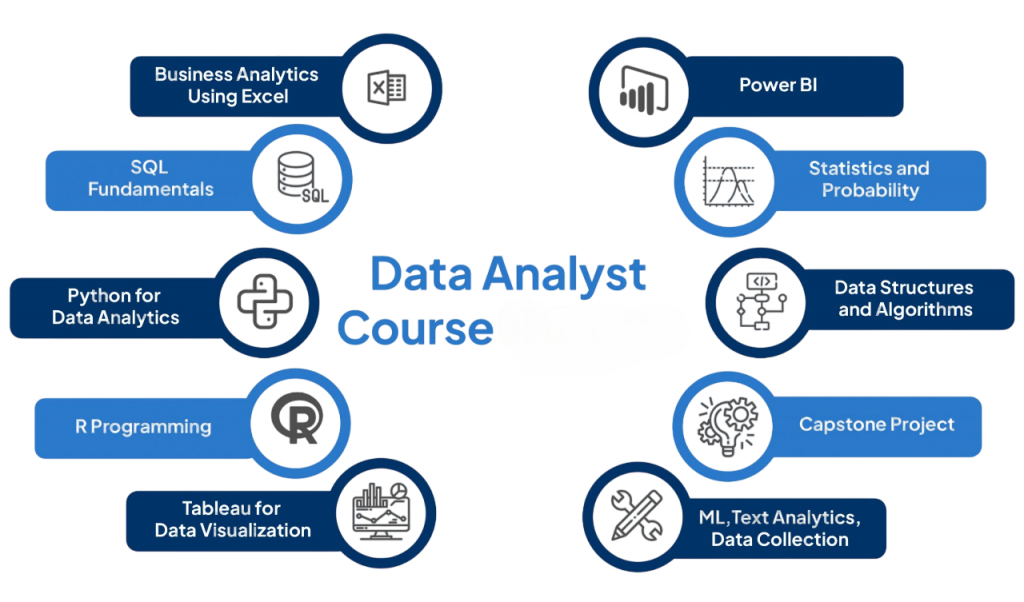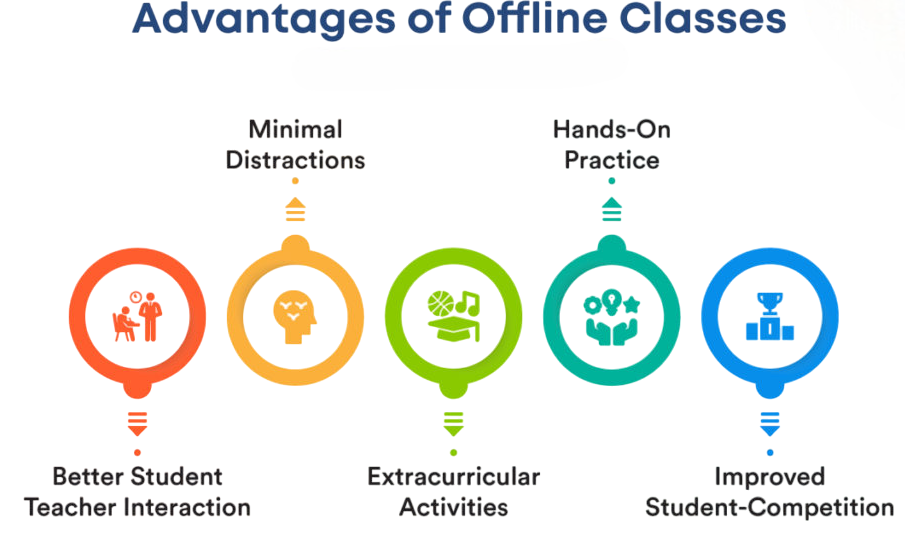
- Data Analytics
- Market Demand for Analytics Professionals
- Types of Analytics Courses
- Business Analytics Programs
- Data Science and Machine Learning Courses
- Big Data Analytics Certifications
- Tools Covered in Top Courses (Python, R, SQL, etc.)
- Online vs Offline Learning Platforms
- How to Choose the Right Course
- Conclusion
Data Analytics
Data analytics is the process of examining, transforming, and modeling data to discover meaningful patterns, trends, and insights. It plays a critical role in decision-making across industries. With the growing reliance on data to drive business strategies, the demand for skilled analytics professionals has surged dramatically. To build expertise in this high-impact field, visit Data Analytics Training a career-focused program that equips learners with the tools, techniques, and strategic mindset needed to turn data into actionable insights. Companies are increasingly looking for individuals who can interpret data to derive actionable insights, improve efficiency, and boost profitability. The surge in digital transformation, IoT, and cloud computing has led to a vast increase in the amount of data generated. This explosion of data requires professionals who can analyze and convert raw data into valuable knowledge. As a result, the popularity of analytics courses has skyrocketed globally.
Market Demand for Analytics Professionals
According to recent industry reports, data analytics is one of the fastest-growing fields in the tech sector. Organizations across finance, healthcare, e-commerce, manufacturing, and entertainment sectors are investing heavily in analytics talent. A report by the World Economic Forum identifies data analysts and scientists as one of the top jobs of the future. Job roles such as Data Analyst, Business Analyst, Data Scientist, and Machine Learning Engineer are in high demand. To understand the infrastructure powering these roles, visit What is Apache Hadoop YARN an essential article that explains how YARN manages resources and job execution in distributed data environments. These roles often offer lucrative salaries, remote working flexibility, and opportunities for continuous learning. The demand is particularly strong in tech hubs like Bangalore, Hyderabad, Mumbai, and Pune in India, and cities like New York, San Francisco, and London globally.
Interested in Obtaining Your Data Analyst Certificate? View The Data Analytics Online Training Offered By ACTE Right Now!
Types of Analytics Courses
There are various types of analytics courses available based on the learner’s goals and experience level: from foundational programs in data handling to advanced modules in real-time processing. To understand the messaging systems that power many of these analytics pipelines, visit Kafka vs RabbitMQ a comparative guide that explains the architectural differences, performance benchmarks, and ideal use cases for each platform.

- Certificate Courses: Short-term programs (1–6 months) focused on foundational knowledge.
- Diploma Courses: Medium-term courses (6–12 months) offering more comprehensive training.
- Postgraduate Programs: Advanced and intensive courses for career changers or upskillers.
- Bootcamps: Fast-paced, skill-intensive programs aimed at quick job readiness.
These courses cover topics like statistical analysis, data visualization, machine learning, predictive modeling, and data engineering.
To Explore Data Analyst in Depth, Check Out Our Comprehensive Data Analytics Online Training To Gain Insights From Our Experts!
Business Analytics Programs
Business analytics combines data science, statistics, and business knowledge to solve organizational problems. Popular business analytics courses teach predictive modeling, data visualization, and decision-making frameworks. To understand the infrastructure that supports these analytical capabilities, visit Who Is a Data Architect a comprehensive article that explains the role, responsibilities, and strategic impact of data architects in modern enterprises.
- Exploratory data analysis
- Business intelligence tools like Tableau and Power BI
- KPI tracking and reporting
- Forecasting and budgeting
- Dashboard creation and storytelling
Institutes like IIMs, ISB, and Harvard offer premium business analytics certifications. Online platforms such as Coursera, edX, and UpGrad also provide specialized programs affiliated with top institutions.
Data Science and Machine Learning Courses
Data science is a fast-moving field that combines machine learning, statistical modeling, data mining, and programming techniques. Machine learning courses offer thorough training in creating algorithms that can learn from complex data sets to make accurate predictions and informed decisions. To build a strong foundation in these techniques and apply them across industries, visit Data Analytics Training a hands-on program designed to equip learners with the analytical skills, tools, and real-world experience needed to thrive in today’s data-driven landscape. These programs cover important areas like supervised and unsupervised learning, advanced regression and classification methods, deep learning frameworks such as TensorFlow and PyTorch, natural language processing, and time series forecasting. Well-known online learning platforms like DataCamp, Udemy, Great Learning, and Simplilearn stand out by providing hands-on case studies and practical projects.
Gain Your Master’s Certification in Data Analyst Training by Enrolling in Our Data Analyst Master Program Training Course Now!
Big Data Analytics Certifications
Big Data Analytics covers a complicated area filled with huge datasets that require advanced processing and analysis. People who want to succeed in this field can pursue recognized certifications that focus on modern technologies like Apache Hadoop, Spark, Kafka, Hive, Pig, and NoSQL databases such as MongoDB and Cassandra. Leading tech companies like Cloudera, Hortonworks, and IBM offer certification programs tailored for IT professionals who want to specialize in data engineering, ETL development, and cloud data architecture. To understand the coordination service that underpins many of these distributed systems, visit What is Apache Zookeeper a foundational article that explains how Zookeeper manages configuration, synchronization, and naming across large-scale data platforms. These certifications prove technical knowledge and give practitioners important skills to work in a tech environment that relies more on data. This training helps them turn complicated datasets into useful insights that support key business decisions.
Are You Preparing for Data Analyst Jobs? Check Out ACTE’s Data Analyst Interview Questions and Answers to Boost Your Preparation!
Tools Covered in Top Courses (Python, R, SQL, etc.)
Analytics courses typically teach the following tools and languages: SQL, Python, R, Hadoop, Spark, and visualization platforms like Tableau and Power BI. To understand how query engines differ in performance and architecture, visit Hive vs Impala a comparative article that explores execution models, latency, and use-case suitability for big data querying.
- Python: Most popular language for data science and analytics
- R: Preferred for statistical computing and visualization
- SQL: Essential for querying relational databases
- Excel: Still widely used for basic data analysis and dashboarding
- Power BI / Tableau: For data visualization and BI reporting
- SAS: Used in industries like banking and pharmaceuticals
Courses blend theory and practical application using hands-on exercises and real-world datasets.
Online vs Offline Learning Platforms
In today’s changing learning environment, analytics education has developed to provide various and flexible learning options through both online and offline platforms. Websites like Coursera, Udemy, DataCamp, and UpGrad give digital learners affordable choices that fit their schedules. These options are perfect for working professionals who want to improve their skills. To understand the real-world hurdles they may face and how to overcome them, visit Big Data Challenges With Solutions a practical guide that explores common obstacles in data handling and the strategies used to solve them across industries.

Meanwhile, traditional offline institutions such as NIIT, Aptech, and university programs still offer structured classroom experiences that include valuable face-to-face interactions and campus placement support. New hybrid models are increasingly combining these approaches. They blend the convenience of online learning with occasional in-person mentoring, creating educational experiences that meet different learning preferences and professional growth needs. This varied approach allows aspiring analytics professionals to choose educational paths that suit their personal learning styles, career goals, and time limitations.
How to Choose the Right Course
Selecting the right course depends on several factors: your current skill level, career goals, preferred learning format, and the technologies you want to master. To understand how different processing frameworks shape these learning paths, visit Spark vs MapReduce a detailed comparison that highlights performance, scalability, and suitability for real-time versus batch data processing.
- Current skill level
- Career goals
- Course content and curriculum
- Reputation of the provider
- Job placement support
- Budget and time commitment
Always check for industry-aligned syllabi, mentor support, access to live projects, and alumni reviews. Free demo classes and trial periods can help you make an informed decision.
Conclusion
Analytics courses have become a key investment for students and professionals aiming to future-proof their careers. With multiple formats, platforms, and specialization areas, there’s a course available for every learner. Whether you’re a beginner exploring data or an experienced professional upgrading your skillset, pursuing analytics education can significantly boost your career prospects. To build a strong foundation in data handling, modeling, and visualization, visit Data Analytics Training a comprehensive program designed to equip learners with the practical tools and strategic mindset needed to thrive in today’s data-driven industries. As more organizations turn to data-driven strategies, those equipped with analytics skills will be at the forefront of innovation and leadership. Enrolling in a high-quality analytics course can be the stepping stone to a rewarding, future-ready career.


